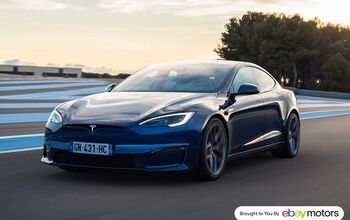GMNext: "Why Not Turbo (almost) Everything?"
GMNext "team member" (and former AutoWeek freelancer) Chris Terry "reveals" what we've known since we hung out with Maximum Bob in a small, windowless room at The New York Auto Show: the Camaro is looking at a turbo-four. While the pony car faithful are still choking on their Cheerios, ADD-afflicted GM's echoing hybridcars.com's claim that turbos could well be the "new hybrid." "As Europeans have known for the better part of a decade, turbos are tomorrow’s 'replacement for displacement' (although Europe’s inclination towards the turbo has to do with emissions laws and fuel taxes that favor diesels, almost all of which have turbos)… The enthusiast in me says, 'If this is the future of motoring, I’m all for it.'" It's kind of creepy to know that a PR flack is possessed by a car enthusiast. And you'd think Terry would acknowledge U.S. fuel economy and emissions regulations in his ode to blowers. But most importantly, he doesn't answer his headline writer's question. To fill that gap, we offer: turbo-charged engines' [manufacturer-recommended] preference for premium fuel (currently .25 per gallon more expensive than regular), the fact that turbos are most efficient when you don't actually use them (say, during federal fuel economy testing), the possibility of higher maintenance costs and, well, other stuff.
More by Robert Farago


































Comments
Join the conversation
The question/post was meant to provoke thoughts about the future of powertrain and turbos, so I’m glad I’ve achieved that in small measure. I was happy to see reasonable, very informed debate from your readers about what downsized turbocharged gas and diesels actually deliver to consumers. I hope the debate continues. It’s ironic that you think it’s “kind of creepy” that someone who works as a writer in the auto industry—even as PR guy—is a car enthusiast; kinda like finding it “kind of creepy” that a chef might like food, or that Chauncey might love the three-point line. Also, the “headline writer” quip was puzzling; we know exactly no one that has a headline writer for a blog. Do you? As to your objections regarding turbocharging: • You claim that turbos need premium fuel. That’s only partially true, but mostly not true . . . at least not with modern engine management systems. Take the engine in question, the 2.0 turbo Ecotec. Premium is recommended. But premium is not required or “needed” as you wrote. • If you’ve ever filled up a diesel here, you’ll find that there is typically only one grade available; there is no “premium.” Most turbos in this country are diesels (heavy light-duty trucks), still, though that may change in the next decade as more gas turbos come to market. • You’re right that turbos are most efficient when you don’t actually use them (to their full potential, which to be fair is what I think you were intending to mean). The problem, again, is your conclusion, that this makes them bad. Ask yourself this: what percentage of your driving is actually done at full throttle? Even the most leadfooted among us knows that once up to speed, your engine is loafing, most likely spinning between 2,000 and 3,200 rpm. This is part throttle (i.e. inefficient), which means that unless you’re calling up full engine power, which is maybe 10% of the time, you’re driving around with a smaller, more fuel-efficient engine. This is especially true in the U.S., where most consumer driving is actually suburb to suburb (things get worse in the city, no question/argument; yet interestingly in Lausanne and Geneva earlier this month, I saw zero hybrids in three days. Go figure.) • Higher maintenance costs? Likely, especially if you actually change the oil at recommended intervals with recommended blends. But again, you may have the jumped the gun on drawing the right conclusion. Ask the bigger question: will marginally higher maintenance costs outweigh the fuel economy improvements and associated fuel cost savings? Even considering the the added purchase cost? The answer depends on the vehicle, the driver and the driving cycle. Finally, and for the record, I am not, nor have ever been, an employee of AutoWeek. Did you ask AutoWeek? Did you look at the masthead? Puzzling that you must have googled my name to find two articles I wrote as a freelancer many years ago and concluded from only two stories that I was an employee. To paraphrase Daniel Patrick Monihan, “You’re entitled to your own opinions, but not your own facts.” Chris Terry, GMnext.com
christe:
Thank you for responding to the post. You may be interested to note that you are the first GM employee to ever do so. Congratulations, and duck!
Seriously…
1. Tongue was planted firmly in cheek when I riffed on your phrase “the enthusiast in me.” But it does imply that you have to channel your inner enthusiasts, rather than living the dream. In general, you’re right: I find that most PR flacks in this industry are not what I’d call car enthusiasts. But that’s me. Your mileage may vary.
2. Yes, obviously, it’s true that the 2.0-liter turbo Ecotec recommends rather than requires premium. I think it’s a distinction without a difference. Do you need to use premium? No. Regular will do– but it reduces power to avoid predetonation. And if it’s no biggie, why does GM recommend it? And can you blame buyers for following the manufacturers’ recommended guidelines for operation?
In any case, I’ve amended the text as follows: “…turbo-charged engines’ [manufacturer-recommended] preference for premium fuel (currently .25 per gallon more expensive than regular)…”
3. The “headline writer” whose question you didn't answer-- "Why not turbo (almost) everything?”-- could be you. Quip quibble aside, the point remains. Your text says “here’s why we should” go turbo, not why we shouldn't. Not the same thing.
4. Not sure why you're bringing up my failure to acknowledge that turbo-diesels don't run on premium fuel-- especially when you blog post implied blown oil burners are a European thing. In any case, to suggest that A) I don’t know that diesel is mostly a single grade fuel and B) I was factually incorrect because my premium fuel objection didn't apply to oil burners is disingenuous. Do you really want me to put “diesels excepted” in parenthesis?
5. As far as the your “part-throttle not full-throttle” argument is concerned, many of our commentators have already pointed out that the amount of boost summoned, and revs required to do so, and resulting mpgs, depends on the size of the engine vs. the weight of the vehicle. If you think a turbo-four Camaro would spend most of its time lolly-gagging at part throttle, or that the turbos wouldn’t spool like crazy from a standstill (sucking down REGULAR gas), I challenge you to prove it. [NB: hyper-milers are not representational drivers.]
Now you could tune the blown four for mpgs (as your boss the Car Czar suggested in New York). But the resulting loss of accelerative urge could kill sales. Engine efficiency can’t be seen in isolation. If Honda (for example) can make a normally aspirated car in the same class as a turbo-four Malibu that gets as good or better mpgs, a blown four will get blown out of the water.
6. “…yet interestingly in Lausanne and Geneva earlier this month, I saw zero hybrids in three days. Go figure.” Rest assured, I will contemplate the full implications of this remark.
7. “Ask the bigger question: will marginally higher maintenance costs outweigh the fuel economy improvements and associated fuel cost savings? Even considering the the added purchase cost? The answer depends on the vehicle, the driver and the driving cycle.” See? You DO know how to raise the important points. Too bad this wasn’t included in the original blog post.
8. Again with the hair-splitting. I know a freelancer isn’t an employee, but c’mon. Sigh. Text amended. But while we’re on the subject, if you care to share, what is your journalistic background? No diss. Just curious.
Again, thank you for engaging in this online conversation. I’m extremely grateful for your testicular fortitude, for running the gauntlet of TTAC’s Best and Brightest. Let’s do this again.
chiste... Robert is right. Thanks so very much for joining our world. We all welcome your input. I want to avoid showing my incompetence so will not get between you two. However, as for the hybrids in Europe...its because of the diesel availability. I still believe that once allowed, they will be successful in the US. And as far as I am concerned...a shout out for bringing on the turbos. There is always room for more. But again, keeping them sized correctly with the correct car will be important. Looking forward to more of your writing.
I've got to second the European diesel availability remark. On my street, there is exactly one Prius. The rest are almost without exception diesels, except for the Cayman and a few other gasoline powered cars. It's amazing how cheap diesel can be when there is actual demand for it! (By the way, I do live in Europe.)